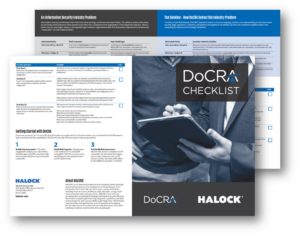HIPAA Compliance & Risk Assessment

HIPAA Compliance
The Health Insurance Portability and Accountability Act (HIPAA) Security Rule and Meaningful Use require that organizations implement security controls that are “reasonable and appropriate” for their organization. To comply with these guidelines, the regulations instruct each organization to (1) select its security controls based on risk assessments, and (2) oversee the effectiveness of those controls using risk management.
ARTICLE: Top Cyber Threats in Healthcare
HIPAA Risk Assessment and Compliance
When HIPAA security risk assessments are performed correctly, the organization knows how much to invest in security and can demonstrate that the controls over Protected Health Information (PHI) are “reasonable and appropriate,” which is crucial for HIPAA compliance. Through our HIPAA compliance consulting services, HALOCK guides clients through risk assessments so that they can identify — in a clear, repeatable manner — what parts of their organizations they must prioritize to address both compliance and security.
Our HIPAA risk assessment methodology conforms to ISO 27005 and NIST 800-30, and ensures that the HIPAA requirements for risk assessments are fully met and achieve the following benefits:
- Information security investments are measurably “reasonable” and “appropriate” as HIPAA and Meaningful Use require.
- Information, systems, processes, people and facilities that can create risk are identified and assessed to ensure HIPAA compliance.
- Risks are prioritized, in part, by the impact that a threat has on the organization and its responsibilities.
- Information risks are considered in terms of the business mission as well as the organization’s responsibilities to its customers, providing a unified view of risk that aligns with HALOCK’s Purpose Driven Security® approach.
In addition to our HIPAA assessment services, HALOCK offers a full suite of HIPAA security risk treatment programs and HIPAA risk management plans to help you achieve and maintain HIPAA compliance.

HIPAA Risk Treatment
HIPAA security risk assessments are performed to alert management about what could go wrong with PHI and Electronic Medical Records (EMR). Those risks remain a liability unless “reasonable and appropriate” security controls are established to protect that information and keep those controls effective.

HIPAA Risk Management
HIPAA security compliance is not a point-in-time achievement, but rather a duty of care process that operates over time. To achieve ongoing due care, HIPAA risk management is applied. This involves monitoring and correcting security controls so they remain effective at reducing risk.
HALOCK acts as your HIPAA consultant to help establish key processes for monitoring and addressing risks to protected health information (PHI) and the EMR. Our HIPAA risk assessment and management plan ensures that risk owners are accomplishing their assigned tasks; it also provides easily maintained metrics for demonstrating that security and compliance investments are “reasonable and appropriate.” Through Duty of Care Risk Assessment (DoCRA), we help you establish reasonable safeguards based on your organization’s mission, objective and obligations.
Based on ISO 27001 and NIST 800-30, HALOCK’s compliance consulting and risk management methodologies are practical and scalable — and easily applied in most organizations regardless of size or complexity.

Our comprehensive Risk Management Program can help you continually manage your risk to be “reasonable”, prioritize your IT investment and resources, and provide you with ready executive reporting to justify your budgets.
Many are working remotely and practicing social distancing. We are relying more on electronic exchanges like telehealth apps to protect our physical health, but we then increased the risk to our data health. We can help adjust your security profile to accommodate your evolving threat landscape. HALOCK partners with you to establish reasonable security controls based on your organization’s mission, objectives, and obligations.
KEEPING YOU INFORMED – HALOCK SECURITY BRIEFING FOR CLIENTS
The HALOCK Security Briefing is a review of significant events, trends, and movements that will influence how you manage cybersecurity, risk, and compliance. Our clients receive periodic overviews with an extensive report file on the topics discussed. This insightful document also includes reference links throughout the report for easy navigation and deeper research.

ESTIMATING RISK
Estimate risk based on real threat data. Read Appendix D in the 2024 Verizon Data Breach Investigations Report (DBIR) to augment your risk analysis.
Frequently Asked Questions
What is HIPAA compliance?
This refers to the process for following the procedures required by the Health Insurance Portability and Accountability Act. HIPAA is the law that established the current standards for protecting patients’ sensitive health-related data. The goal is to ensure healthcare companies do everything possible to secure and protect this information to prevent data breaches.
What is a HIPAA-covered entity?
Entities that are required to adhere to the HIPAA standards include healthcare providers, health plan providers and healthcare clearinghouses. All of these entities are entrusted with patients’ personal information including Social Security numbers (SSNs), bank account details and medical histories. Any enterprise that falls into these categories can benefit from HIPAA compliance solutions.
What are HIPAA violations?
There are a number of ways in which a HIPAA-covered entity can fail to comply with regulations. These can include transmitting patient data without sufficient encryption, disclosing patient information to unauthorized entities or falling victim to cyberattacks that expose the data. The scope of potential violations and the severity of the penalties involved makes it all the more important that businesses enlist the help of HALOCK as their HIPAA consultant.

